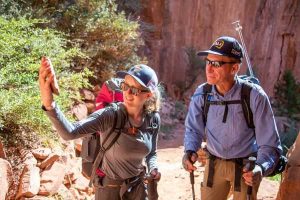Student spotlight
Cecily Combs
Major: Geology Mentor: Abe SpringerNAU undergraduate finds her research home in geology, 4FRI project

For Cecily Combs, not obtaining money for a research grant application turned out to be a blessing in disguise. It gave the senior Geology major an opportunity to work on one of the region’s most significant forestry projects of this century.
The Four Forest Restoration Initiative (4FRI) project is a collaboration between multiple stakeholders, including NAU, and the US Forest Service to restore southwestern forests to their pre-colonial conditions. The intent is to increase biodiversity and make forests more resilient.
A student researcher for hydrogeology and ecohydrology professor Abe Springer, Combs is responsible for monitoring and obtaining water samples from four springs—one in the Kaibab National Forest, one on Hart Prairie, one near Lake Mary and the other near Long Valley. Combs samples the springs before and after the monsoon and before and after snowmelt to see how much water is flowing out of the springs. By recording and maintaining the data, Combs’ research provides a longitudinal view of the effects of the 4FRI forest thinning efforts and controlled burns on groundwater recharge.
The hypothesis, Combs explains, is that with fewer trees to hold moisture, less moisture will be lost to evaporation and plant transpiration. More snowmelt and rainfall, in turn, will infiltrate the ground and recharge the aquifer.
“Some of the sites have received forest thinning treatments,” Combs said. “We’re hoping the data we collect this year will start to show us trends.”
Combs is happy to play a small part in such an ambitious undertaking. The 4FRI project is now a full decade into its 20-year lifespan, and many students at NAU have taken part.
“It’s honestly pretty amazing to know that as an undergraduate with no real qualifications, I was allowed to participate in something that’s going to be a long-standing project, something that’s going to make a difference,” she said. “And I know that I’m just one of many students who is going to be in this spot doing the same research, so I’m going to have to hand over whatever results I get to the next person in just a few months. I need to have all my ducks in a row. My data needs to make sense. I need to have results that they can take and go further with.”
Not too long ago, Combs would have never guessed she would be working on 4FRI…or hydrogeology research at all. During her senior year of high school in Gilbert, Arizona, she wanted to go to a liberal arts school out of state.
She made an official visit to Northern Arizona University and realized she liked Flagstaff, as well as the scholarships NAU was offering.
Once at NAU, Combs still didn’t have a clear academic plan. She tried on several liberal arts majors.
In her sophomore year, she enrolled in Geology 112: Geologic Disasters, a class that non-majors take to get their required lab and science credits.
“It actually ended up clicking with me,” Combs said. “I really enjoyed that class, and after a little while I realized that if I thought it was super cool, maybe I should look into geology.”
A semester later, she declared her Geology major. When she eventually met Springer and expressed an interest in research, he invited her to his weekly research group meetings.
Even though she hadn’t yet taken a hydrogeology class, Combs felt at home with her newfound peers. Eventually, the 4FRI opportunity with Springer opened up.
Combs appreciates the guidance she has received from Springer.
“I like that he doesn’t let you get lost,” Combs said. “He encourages us to work with each other, play to our strengths, and build our network connections. He’s really encouraging us not to grow just as scientists, but as people too.”
The collaboration and support she has received at NAU from Springer and others have made an impact. Her aspirations are much clearer now—Combs sees research in her future, whether in graduate school or for a public or private employer.
“I enjoy learning new systems,” she said. “I feel like it’s more of a team effort, because I don’t know how to do most of this stuff on my own. Having this opportunity and learning how to talk to other people has been good.”
